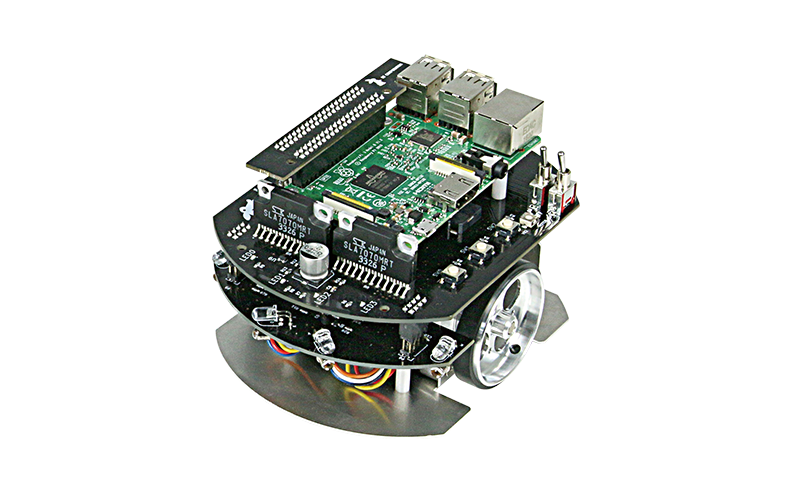ROS 2 node for the Raspberry Pi Mouse.
This branch is dedicated to ROS 2 Jazzy. For other distributions, please refer to the corresponding branches listed below.
- ROS 2 Humble (humble)
- Raspberry Pi Mouse
- Linux OS
- Ubuntu server
- 22.04
- 24.04
- Ubuntu server
- Device Driver
- ROS 2
$ sudo apt install ros-$ROS_DISTRO-raspimouse$ cd ~/ros2_ws/src
# Clone package
$ git clone -b $ROS_DISTRO https://github.com/rt-net/raspimouse2
# Install dependencies
$ rosdep install -r -y -i --from-paths .
# Build & Install
$ cd ~/ros2_ws
$ colcon build --symlink-install
$ source ~/ros2_ws/install/setup.bashBuild and install the device driver in advance.
# Terminal 1
$ source ~/ros2_ws/install/setup.bash
$ ros2 launch raspimouse raspimouse.launch.py
# Terminal 2
$ source ~/ros2_ws/install/setup.bash
# Set buzzer frequency
$ ros2 topic pub -1 /buzzer std_msgs/msg/Int16 '{data: 1000}'
$ ros2 topic pub -1 /buzzer std_msgs/msg/Int16 '{data: 0}'
# or rotate motors
$ ros2 service call /motor_power std_srvs/SetBool '{data: true}'
$ ros2 topic pub -1 /cmd_vel geometry_msgs/msg/TwistStamped '{twist: {linear: {x: 0.05, y: 0, z: 0}, angular: {x: 0, y: 0, z: 0.05}}}'
# Shutdown
$ ros2 lifecycle set raspimouse shutdownThis is a managed-lifecycle node. The node must be configured and activated after being launched before the robot can be used. If running the node manually, after launching the node execute the following command to configure it:
$ ros2 lifecycle set raspimouse configureIf configuration succeeds, execute the following command to activate the node:
$ ros2 lifecycle set raspimouse activateThe robot can now be controlled and sensor information will be published.
The node can be deactivated using the following command:
$ ros2 lifecycle set raspimouse deactivateThis will disable publishing sensor data and stop the motors.
When the node is active, motor functionality can be tested by turning on the motors and sending a velocity command.
$ ros2 service call /motor_power std_srvs/SetBool '{data: true}'
$ ros2 topic pub -1 /cmd_vel geometry_msgs/msg/TwistStamped '{twist: {linear: {x: 0.1, y: 0, z: 0}, angular: {x: 0, y: 0, z: 0.05}}}'Odometry information can be checked by echoing the odom topic.
$ ros2 topic echo /odomSimilarly other sensor information can also be viewed by echoing the relevant topic.
-
buzzerType:
std_msgs/Int16Used to control the buzzer. Provide a value in Hertz and the buzzer will emit that tone.
-
cmd_velType:
geometry_msgs/msg/TwistStampedControls the motors. Specify the forward and turning speeds of the robot.
-
ledsType:
raspimouse_msgs/LedsTurns the four LEDs on the front of the robot on and off.
-
light_sensorsType:
raspimouse_msgs/LightSensorsProvides the raw values from the light sensors on the front of the robot.
-
odomType:
nav_msgs/OdometryProvides odometry. If hardware pulse counters are available and the
use_pulse_countersparameter is set totrue, the odometry is calculated from the motor control pulse counts. Otherwise, the odometry is estimated based on the velocity commands given to the robot and elapsed time. -
switchesType:
raspimouse_msgs/SwitchesProvides the status of each of the three push switches on the side of the robot.
-
motor_powerType:
std_srvs/SetBoolCall this service and pass
trueto enable the motors. Passfalseto disable the motors.
-
odometry_scale_left_wheelType:
doubleDefault:
1.0Use to adjust the odometry input from the left wheel (when using pulse counters to calculate odometry). This is used to account for slight differences in wheel diameter and wheel slip between the left and right wheels.
-
odometry_scale_right_wheelType:
doubleDefault:
1.0Use to adjust the odometry input from the right wheel (when using pulse counters to calculate odometry). This is used to account for slight differences in wheel diameter and wheel slip between the left and right wheels.
-
use_light_sensorsType:
booleanDefault:
trueEnable or disable the light sensors on the front of the robot.
-
use_pulse_countersType:
booleanDefault:
falseUse hardware pulse counters as the odometry source. When set to true, hardware pulse counters will be used only if present.
-
wheel_diameterType:
doubleDefault:
0.048Sets the diameter of the robot's wheel. The unit is in meters.
-
wheel_treadType:
doubleDefault:
0.0925Sets the distance between the wheels. The unit is in meters.
-
pulses_per_revolutionType:
doubleDefault:
400.0Sets the number of pulses needed for 1 rotation of the used motor.
-
light_sensors_hzType:
doubleDefault:
100.0Sets the frequency of the publishing rate of the topic
light_sensors. The unit is in Hz. -
odom_hzType:
doubleDefault:
100.0Sets the frequency of the publishing rate of the topic
odom. The unit is in Hz. -
switches_hzType:
doubleDefault:
10.0Sets the frequency of the publishing rate of the topic
switches. The unit is in Hz. -
initial_motor_powerType:
boolDefault:
FalseSets the initial state of the motor. If set as
True, the motors will turn on when theraspimousenode becomes active. -
odom_frame_idType:
stringDefault:
odomSets the frame_id of the topic
odom. -
odom_child_frame_idType:
stringDefault:
base_footprintSets the child_frame_id of the topic
odom. -
odom_frame_prefixType:
stringDefault:
{empty}Adds prefix to the frames of the topic
odom. If set asmouse, the frame_id and the child_frame_id will bemouse/odomandmouse/baes_footprint.
This repository is licensed under the Apache 2.0, see LICENSE for details.
- Geoffrey Biggs (@gbiggs), original author
- Shota Hirama (@shotahirama)
- Yutaka Kondo (@youtalk)
Contributions are always welcome!
